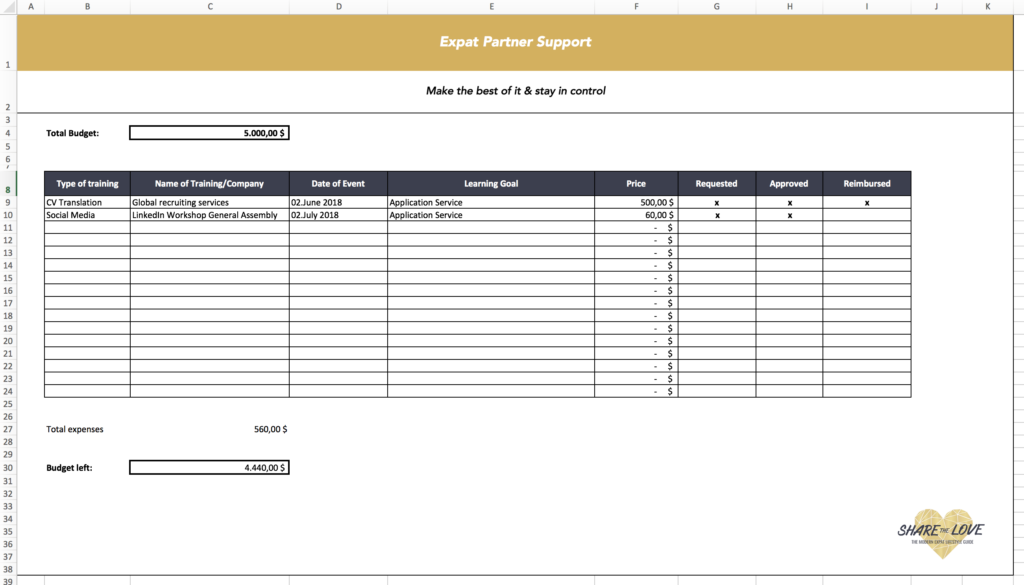
MANAGE YOUR EXPAT PACKAGE EXPENSES
If you are an employee sent abroad by the company you want to read this, I will give an overview of the essential aspects of expat benefits and how to negotiate a better deal.
What is an expat benefit package?
There are many words to describe the benefits expats receive when being transferred abroad by a company: Expat Package, Expat Benefits, Deployment Package are just a few to name. No matter the label, let us dive into what it is you need to know BEFORE and DURING your time abroad. There are hardly any official studies of how big those expat packages are because each company is managing this topic differently. Benefits are highly individual and at the end it is also a matter of negotiation.
The size of the expat package depends on:
The company factor
- Industry
- Company Size
- Company Culture
The human factor
- Management Level
- Family Status
- Children
- Negotiation Skills
Typical parts of an Expat Package
As stated, expat packages are highly individual. There are however benefits that are more common than others. I most recently asked 25 families for their personal benefits. About 70% of them received some sort of Expat Package. International Health Care, Housing Allowance, and flights back home have been the most mentioned items on the list.
While 25 families are not a high number to compare, the answers actually reflected what I am hearing from many others throughout the last year and are hence a good indication to start with.
How expat Packages will change in the future
Not only the world is getting more global but also our minds! Back in the days, companies tried to convince their top employees to accept an international assignment by offering anything to make life abroad as comfortable as possible. Next to financial incentives, many used to have their private driver and other support in the form of employees. Next, to making life more comfortable, this is also connected to the responsibility of supporting the local economy (which is still in practice today). Depending on the country not that much has changed. However, if countries are not that exotic, there are often many employees lining up waiting for their chance to go abroad. So there is less obligation to make this journey attractive. Therefore many experts argue that expat packages are decreasing in value and number of benefits over time.

However, at the same time, we see a second trend: The rise of dual-career couples. Nowadays more and more young professionals are shying away from taking on an international assignment if the partner can’t find work. Most accompanying partner will stop working during the time abroad. As an effect, household income is decreasing despite the financial benefits of the expat package (depending on the deal).
As a consequence, more and more employees are demanding expat partner support in the form of work permit management, language courses, and career coaching. Intercultural training and educations packages are becoming more popular. Smaller companies are not aware of the need to the same extent but are slowly realizing that coaching is not that expensive for the company to pay but has a very positive effect on the attitude of the partner towards the expatriation adventure.
Don't miss out on new posts and free templates
How to negotiate the expat package
There are a couple of tips I can mention from experience that many expats would have loved to consider upfront. Of course, each situation and company policy is different but I am a huge believer in: Nothing will get better if we won’t communicate our needs! So here it is, my top tricks:
- Negotiate upfront: When expatriation is on the table know your value and the benefit you will bring. Negotiating upfront will always be more accessible than doing it from abroad.
- Research: HR departments act on the feedback of previous experiences but have most likely not moved abroad with their whole family before. Therefore, it is always wise to form your own opinion by talking to former expats, search in expat forums and speak to expats online that are living in the respective country right now.
- Include your partner: Think about how your employer can support your partner. Think about work permit, coachings, language courses, etc. Remember that those costs are mostly only a fraction of the budget but will have a significant impact on the wellbeing of the partner.
- Make your family visible: Let the HR partner know about your family situation. Maybe let your partner communicate directly with the HR representative. Mostly this has a positive effect on getting training fees accepted.
- Make life easier: if you want your company to pay for a specific thing always think about the reasoning behind and let them know. Write short information about why that benefit is important, what the costs would be, the timeframe, etc. This way it will be easier for the HR representative to authorize the training.
WHAT IF THERE IS NO EXPAT PACKAGE?
Some words to the Expat Partner: Don’t be discouraged if you don’t get enough financial support from your partner’s employer. These support packages are not a guarantee for success. What you mostly need lies within you already: drive, persistence, and patience. You need to define a strategy for yourself on how you want to approach your career during your time abroad – with or without an Expat Package.
However, only because their is no defined process within the company for expat benefits it never is too late to ask!
TRACK YOUR BUDGET EXPENSES
If you find yourself in the lucky position to have access to an Expat Education Package I only can recommend you to use it wisely. At the very beginning, I set up an Excel sheet to follow up on all my expenses and to keep track on the budget left to decide on whether to add another training for myself or not.
Here is a picture of that Excel sheet. If you want to track your budget in a similar way you can download this sheet with a simple click for free. Customize it to your own needs and likes.
I hope this information is helpful to you and will encourage you to ask for some benefits! Let’s connect via Social Media or send me a message to info@sharethelove.blog if you want to chat about it.
Happy Budgeting!
Thanks for sharing the love and stopping by

Send this article to a friend & share the love:
You also might like:

Why career coaching is so essential in times of new work
As a coach, I have seen a visible increase in the need to explore different career options. While some clients are finally planning to tackle going back to work after a long break, other clients are seeking a shift in their current career feeling their skills and values are not matched with their current profession. During the pandemic the buzzword „The great resignation“ came up, illustrating the global need for creating a new work-life balance. In this article, I will highlight some interesting global facts around the topic of the great resignation and explore why coaching is such an essential tool for employees (and potential employees) to gain realignment with their careers.

A Different Approach to Everyday Life: A Return to One’s Own Values Abroad
Living abroad not only opens up a completely new view of the country and its people. The perception of worldwide cultural differences also does something to one’s own ideas. What is desirable? What belongs to the things that are absolutely necessary and what are things that are considered absolutely necessary in one culture and play no role at all elsewhere? This becomes very vivid if you make yourself aware of an everyday situation in a very concrete way. In this article, I look at the different designs of children’s rooms around the world and what this has to do with a return to our basic instincts.

Alltag anders: Die Rückbesinnung auf eigene Werte im Ausland
Das Leben im Ausland eröffnen einem nicht nur eine vollkommen neue Sicht auf Land und Leute. Die Wahrnehmung von weltweiten Kulturunterschieden macht auch etwas mit den eigenen Vorstellungen. Was ist erstrebenswert? Was gehört zu den Dingen die man unbedingt braucht und was sind Dinge die in einem Kulturkreis als unbedingt notwendig angesehen werden und woanders überhaupt keine Rolle spielen? Ganz plastisch wird das wenn man sich einmal ganz konkret an einer Alltagssituation bewusst macht. In diesem Artikel widme ich mich der unterschiedlichen Ausgestaltung von Kinderzimmern weltweit und was das mit dem Zurückbesinnen auf unseren Urinstinkt zu tun hat.

Why less families decide to move abroad
Are families less willed to move abroad in this world of uncertainty? How will expat assignments change within the next year? How to make the decision of moving abroad or working from home in another country? This article is shedding some light on the future of global mobility in the world we are living in right now.

The effect of giving yourself an A
What happens when you pretend the best case scenario already happened? Sharing a fun and compelling coaching exercise called „giving yourself an A“

The 4 types of Female Expats
How differently do women approach the concept of a career abroad? What traits can be assigned to the various international CVs? I spoke with 30 female breadwinners who have made it abroad and identified 4 types that have emerged time and again. In this article, I discuss each type and show what you can learn from them.








2 Antworten
Relocating to a new home can be stressful, but choosing the right moving company can make all the difference. Whether you’re moving across town or across the country, professional movers can help ensure a smooth transition. Discover the best residential movers in Downtown Denver for reliable and affordable moving services.
When moving abroad, having the right expat package can make a world of difference, helping you transition smoothly. But no matter how well-prepared you are, having professional movers by your side is key to a stress-free relocation. For reliable moving services, check out the professional home movers in Downtown Denver.